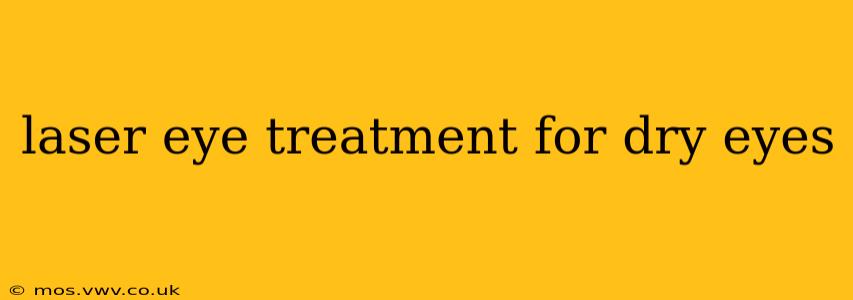Dry eyes are a common ailment, causing discomfort and impacting vision quality. While laser eye surgery, like LASIK, primarily addresses refractive errors (nearsightedness, farsightedness, astigmatism), the relationship between laser eye treatment and dry eyes is complex. This comprehensive guide explores this connection, addressing common questions and concerns.
Does Laser Eye Surgery Cause Dry Eyes?
Yes, laser eye surgery can contribute to or worsen dry eye symptoms in some patients. The procedure involves reshaping the cornea, and this process can sometimes disrupt the tear film's production or distribution. The nerves responsible for tear production and eyelid function can be temporarily or, in rare cases, permanently affected. The severity of dry eye symptoms varies considerably depending on the individual, the type of laser surgery performed, and the surgeon's skill.
How Does Laser Eye Surgery Affect Tear Production?
During LASIK and other refractive surgeries, a flap is created in the cornea. This flap is then lifted, the underlying corneal tissue is reshaped with a laser, and the flap is replaced. This process can disrupt the delicate balance of the tear film, affecting both tear production and the way tears are spread across the eye's surface. Additionally, the laser energy itself can sometimes damage the delicate nerve endings that regulate tear production.
What are the Common Dry Eye Symptoms After Laser Eye Surgery?
The symptoms of dry eyes after laser eye surgery can range from mild to severe and often include:
- Burning or stinging sensation: A common early symptom, often felt immediately after surgery or in the days following.
- Itching: Can be caused by the irritation of a dry eye surface.
- Foreign body sensation: The feeling of something in the eye, even though nothing is there.
- Excessive tearing: Paradoxically, some people experience increased tearing as the eyes try to compensate for dryness.
- Blurred vision: Dryness can distort vision.
- Light sensitivity (photophobia): A dry eye surface can be more sensitive to light.
Can You Get Laser Eye Surgery if You Have Dry Eyes?
While pre-existing dry eye can be a contraindication for laser eye surgery, it doesn't automatically disqualify you. Your ophthalmologist will conduct a thorough pre-operative assessment to evaluate the severity of your dry eyes. If your dry eyes are mild and well-managed, surgery may be possible. However, if your dry eyes are severe or uncontrolled, it's likely your surgeon will advise against the procedure or recommend delaying it until your condition improves.
What Treatments Are Available for Dry Eyes After Laser Eye Surgery?
Fortunately, numerous treatments can help manage dry eye symptoms after laser eye surgery. These include:
- Artificial tears: Over-the-counter lubricating eye drops are often the first line of defense.
- Prescription eye drops: Your doctor may prescribe stronger medications to stimulate tear production or reduce inflammation.
- Punctal plugs: Small plugs inserted into the tear ducts to reduce tear drainage.
- Warm compresses: Applying warm compresses to the eyelids can help soothe and stimulate tear production.
- Lid hygiene: Regularly cleaning the eyelids can remove debris and improve tear film function.
Are There Laser Treatments for Dry Eyes?
While laser eye surgery itself isn't a treatment for dry eyes, some advanced technologies are being explored. These are not yet widely available but are promising areas of research.
How Long Do Dry Eye Symptoms Last After Laser Eye Surgery?
The duration of dry eye symptoms varies. For some, symptoms are mild and resolve within a few weeks. Others may experience persistent dryness for months or even longer. Close follow-up with your ophthalmologist is crucial to monitor your progress and manage any persistent symptoms. It's important to remember that each individual’s experience is unique.
Conclusion
The relationship between laser eye surgery and dry eyes is multifaceted. While the procedure can sometimes contribute to or worsen dry eyes, effective management strategies exist. Open communication with your ophthalmologist before, during, and after the procedure is essential to ensure a safe and comfortable experience. Remember to always consult a qualified eye care professional for any concerns about dry eyes or laser eye surgery.
